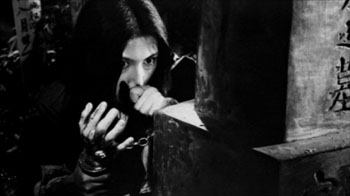Finding a steady quality throughout film trilogies that are directed by the same person is a rarity. Sure, there are a handful that spring to mind, but there’s a lot more that don’t. What’s even rarer is when the final film in a trilogy is equal to or better than the previous entries in the series. I can honestly only think of two: Sergio Leone’s  The Good, the Bad, and the Ugly, and Shunya Ito’s Female Prisoner Scorpion: Beast Stable. That’s some pretty damn good company for a film bred out of the exploitation genre. While not everyone will agree, Beast Stable is the pinnacle of the Scorpion series in my modest opinion.
The Good, the Bad, and the Ugly, and Shunya Ito’s Female Prisoner Scorpion: Beast Stable. That’s some pretty damn good company for a film bred out of the exploitation genre. While not everyone will agree, Beast Stable is the pinnacle of the Scorpion series in my modest opinion.
The film picks up sometime after the events of Jailhouse 41, with Matsu still on the lam. She seems to have integrated herself well into society, with an apartment of her own and a job at a sewing factory. The hunt is still on for her however, and she’s spotted while riding the subway by a detective by the name of Kondo. A struggle ensues, and Detective Kondo handcuffs himself to Matsu just as she makes it out of the subway car doors. The one they call Scorpion isn’t so easily caught, and she cuts off Kondo’s arm to escape.
Matsu ends up in a graveyard, where she attempts to free herself from the handcuffs (and the severed arm) by grinding them against a gravestone. It just so happens that a prostitute, named Yuki, has just finished conducting some business in the graveyard, and spies Matsu just before she passes out from exhaustion. Sometime later, Matsu is awakened by a large man looking to sexually assault her, and is nearly killed by her before Yuki intervenes. Matsu finds out that Yuki brought her back to her home, and the man is her retarded brother, who’s only driving force since falling victim to an accident is a strong desire for sex, which Yuki provides personally to keep him happy. While it may make her brother happy, the situation doesn’t please Yuki, and knowing Matsu is a fugitive with a record, asks her to kill him.
While Matsu contemplates this back at her apartment, she’s accosted by a man named Tanida in the building, and he begins forcing himself on her. When she refuses, he brings out a wanted poster, and says if she doesn’t decide to be with him by the next day, he’ll turn her into the police. The following day as Matsu leaves for work, Tanida meets her on the stairs and proceeds up into her room to wait for her return. Unbeknownst to him, Matsu knows that his woman, who lives in the building and is the reason he’s always around, is watching and sees the exchange between the two. That night, Matsu calls the club at which the woman works and drops a little hint that she may be losing her man. The woman then goes home, boils a pot of water, and walks up to Matsu’s room, thinking Matsu will be there, not realizing Tanida is still there waiting alone. When he opens the door, she douses him with the scalding water, and it ultimately leads to his death.
What Matsu doesn’t realize is that while eliminating one problem, she’s just created an even bigger one: Tanida was a member of a gang that runs a prostitution ring, and they quickly seek her out and bring her to their base. They want to be compensated,  either monetarily or by pimping her out on the streets…that is until the leader of the group, Katsu, lays eyes on her and recognizes her from their time in jail together. Katsu now plans to make Matsu’s life a living hell, just like Matsu did to her in prison, and one Detective Kondo hasn’t given up his search for Scorpion either.
either monetarily or by pimping her out on the streets…that is until the leader of the group, Katsu, lays eyes on her and recognizes her from their time in jail together. Katsu now plans to make Matsu’s life a living hell, just like Matsu did to her in prison, and one Detective Kondo hasn’t given up his search for Scorpion either.
The first thing you’ll notice about Beast Stable is that the film is a completely different entity than the two previous entries in the series. The entire atmosphere has changed; no longer are we subject to the claustrophobic nature of the prison walls that once held Matsu, nor does she consistently have to look over her shoulder at every turn. There’s some breathing room to be had here, and it works in the films favor greatly. Shunya Ito was not content to rest on his laurels; if you look at basically every other series in the Pinky Violence genre, you’ll find much of the same throughout each film. The formula that made the first so successful is then washed, rinsed, and repeated through each subsequent film. Not so here, and that’s certainly why the Scorpion series is held in such high regard.
The overall tone of the film is something altogether different as well. It’s a shame that after this film, director Shunya Ito didn’t go on to make anything of note, because it’s in Beast Stable where I feel he was most confident and in total control of his talents. Ito attempts things here that he didn’t in the first two films, and it’s because of that confidence that they come off so flawlessly. The major difference you’ll find is that Matsu’s near-silence from the first two films has translated over to many other facets of the film. There are long stretches without dialogue, where the story is told through physical action, decisive facial expressions, and sweeping camera work with only natural sounds to accompany them. In this respect, the film comes off feeling like something Sergio Leone may have directed.
Likewise, the artistic direction is at an all-time high in Beast Stable. While most would point to Jailhouse 41 as the artistic “high point” of the series, I would have to disagree. Jailhouse 41 certainly has the most outlandish moments and jarring transitions, but that’s just the thing; I personally felt those moments didn’t integrate themselves very well with the rest of the narrative. They came off feeling forced. The experience Ito gained with his experimentations in Jailhouse 41 pay off in Beast Stable though. There are some truly awe-inducing moments in the film that should make any respectable cinephile feel all warm and fuzzy inside. You’ll see amazing lighting techniques, a wonderful use of time-lapse photography during a bar scene, incredible long shots down prison corridors, a rain of matches while Matsu hides out in the sewers,  and a death sequence bathed in stark whites that must be seen to really appreciate. Ito also uses the most mundane of items to express emotions, such as a boiling kettle and striking matches in quick succession to indicate ones emotional state. There’s much on display in the film that will stick with you for some time after.
and a death sequence bathed in stark whites that must be seen to really appreciate. Ito also uses the most mundane of items to express emotions, such as a boiling kettle and striking matches in quick succession to indicate ones emotional state. There’s much on display in the film that will stick with you for some time after.
Keeping in line with the poise shown in every other aspect of the film, Meiko Kaji turns in arguably the best performance of her career. Unlike the previous two films, Kaji is the main attraction in Beast Stable; there’s no warden or group of inmates to share screen time with. The weight of the film is put on her shoulders, and she carries it wonderfully. The character of Matsu is allowed far more growth than before, and she displays emotions not found earlier. While there was always an inclination that she cared for others, that element of her character comes out in full fruition here. Matsu shows affection in ways one may not expect, including a single tear shed, whether out of pity or anger is up for debate, over the treatment of a prostitute. In many ways, we get to see what sort of person Matsu may have been if her path in life had taken a different route.
Female Prisoner Scorpion: Beast Stable is a remarkable finale to one of the finest trilogies in film history. Each entry evolves into something completely new, yet still has the uncanny ability to retain the high quality of the film that preceded it, and in some cases improving upon already excellent aspects. Through Meiko Kaji’s acting ability as well as phenomenal writing, the central character of Matsu also develops and grows with each film, which is something that you don’t come across often. If you’ve never experienced a film from the Scorpion series, there’s no better time than now to change that. Matsu’s journey through hell and back is one you won’t soon forget.
Please feel free to discuss "Female Prisoner Scorpion: Beast Stable" here, in our forums!

